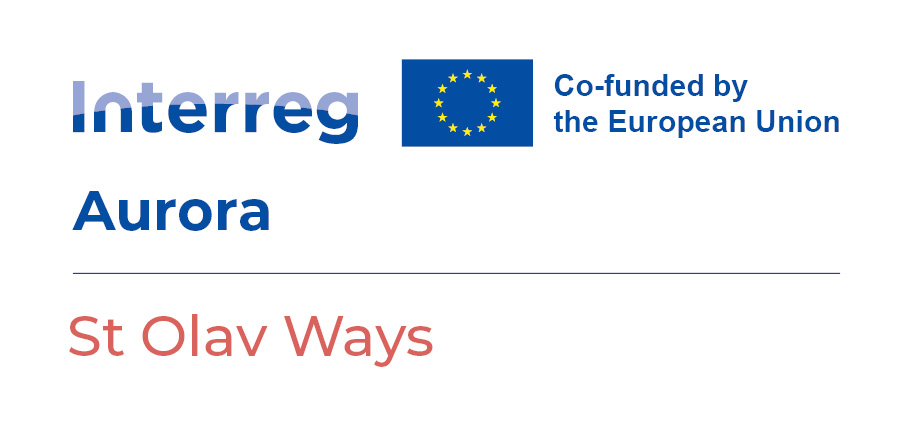Das Projekt St. Olaf Österbotten
Bereits seit dem Jahr 2019 wird der Pilgerweg St. Olaf Österbotten entwickelt, der sich durch ganz Österbotten erstreckt, von Kokkola (Karleby) im Norden bis Kristinestad im Süden. Die ca. 500 km lange Strecke ist in 21 Tagesetappen unterteilt.
Der östbottnische Pilgerweg entstand im Rahmen des Projekts St. Olaf Ostrobothnia mit dem Ziel, eine europäische Kulturroute und einen Pilgerweg durch Österbotten zu schaffen. Dabei war es das Bestreben, den östbottnischen Weg mit dem norwegisch-schwedischen St. Olafsleden zu verbinden, mit Trondheim als finaler Destination. Dadurch ist der Weg Teil der nördlichsten Kulturroute, die vom Europarat zertifiziert wurde.
Die Zertifizierung der Route sowohl als Europäische Kulturroute als auch als St.-Olafs-Weg wurde 2023 beantragt. Sie bietet eine fantastische Gelegenheit für ganz Österbotten, Teil des europäischen Netzwerks von Kulturrouten zu werden. Sie schafft Sichtbarkeit für die
gesamte Region und setzt Österbotten auf die europäische Landkarte. Sie bietet Organisationen, Unternehmen, Vereinen und Gemeinden die Möglichkeit, Dienstleistungen und Produkte für lokale, regionale, nationale und internationale Wanderer und Besucher zu entwickeln und
zu vermarkten.
Link zu den vom Europarat zertifizierten Kulturrouten: https://www.coe.int/en/web/cultural-routes.
Das Projekt St. Olaf Österbotten wurde von der Aktion Österbotten, dem Ministerium für Bildung und Kultur, dem Schwedischen Kulturfond in Finnland und der Harry Schauman Stiftung gefördert. Projektträger ist die Gemeinde Kvarnen in Kronoby, die Unterauftragnehmer sind KulturÖsterbotten und die Handwerkskammer Kristinestad.
Ansprechpartnerinnen und Ansprechpartner für die Projektgruppe:
- Carola Wiik, Projektleiterin, Gemeinde Kvarnen
- Martin Näse, Routenplanung, Gemeinde Kvarnen
- Heidi Hummelstedt, Historische Zeugnisse, Natur- und Kulturerbe, KulturÖsterbotten
Der Referenzgruppe gehören außerdem folgende Mitglieder an:
- Angelique Irjala, Handelskammer Kristinestad
- Åsa Blomstedt, KulturÖsterbotten
- Ann-Sofi Backgren, Kvarkenrat und Schwedische Agentur für ländliche Entwicklung
- Annina Ylikoski, Regionalrat von Österbotten
- Lilian Petterson-Smeds, Historische Gesellschaft Oravais
Project facts:
- Project owner: Kvarnen Samkommun
- Project participants: KulturÖsterbotten and Kristinestad Business Centre Ltd.
- Project area: Ostrobothnia (Kristinestad-Kokkola)
- Project schedule: Started in 2019. The project is ongoing.
Details zum Projekt:
- Projekteigentümer: Gemeinde Kvarnen
- Unterauftragnehmer: KulturÖsterbotten und Kristinestad Handelskammer
- Projektgebiet: Österbotten (Kristinestad-Kokkola)
- Projektdauer: Projektbeginn 2019. Das Projekt ist noch nicht abgeschlossen.
Finanzierung:
- Europäischer Landwirtschaftsfonds für die Entwicklung des ländlichen Raums (ELER); Leader
- Schwedischer Kulturfond in Finnland
- Harry Schauman Stiftung
- Ministerium für Bildung und Kultur
- Budget ca. 250.000 €.
The pilot project St Olav Pathway
The route of St Olav ways is a Nordic pilgrimage hiking route certified by the Council of Europe (www.coe.intl) through ACSOW Association in Norway. St Olav Way consists of different pilgrimage hiking routes in Finland, Sweden and Norway.
The pilot project St Olav Pathway joins the project partners Kvarnen samkommun (Kvarnen joint municipality) administering St Olav Ostrobothnia in Finland and Selånger församling (Selånger parish) administering St Olavsleden in Sweden with the overall objective of cross-border networking and collaboration. Furthermore, the objective is to make plans for cross-border co-working methods, organization structures, task management, financing, joint development, sustainability and quality certifications systems possible to implement into these cultural routes. This with the aim of forming a development strategy and joint large scale project with partners and possible stakeholders such as municipalities, associations, organizations and MSMEs discovered through this project. The objective of this project is also to carry out a historical survey deepening our knowledge and understanding about our joint cultural and historical heritage in St Olav as well as a
survey of methods and strategy for how to implement the democratic values stated by Council of Europe into St Olavsleden and St Olav Ostrobothnia.
Council of Europe certification rules states continuous development as a certification criterium. The project results support the certification criteria in every sense. The results will be used by the project partners as well as stakeholders such as collaborative partners, municipalities, associations, parishes and MSMEs. The project results strengthen the joint brand of St Olav and the geographical area locally, regionally, nationally, and internationally.


